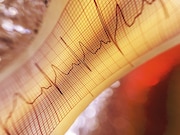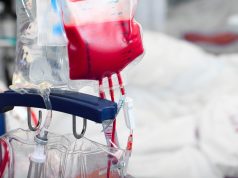Clinical chemistry score based on cardiac troponin, glucose level, estimated glomerular filtration rate
THURSDAY, Sept. 13, 2018 (HealthDay News) — A score based on the results of three laboratory tests has higher sensitivity and specificity than cardiac troponin alone for stratifying patients presenting with suspected acute coronary syndrome, according to a study published online Aug. 19 in CMAJ, the journal of the Canadian Medical Association.
Peter A. Kavsak, Ph.D., from McMaster University in Hamilton, Canada, and colleagues constructed a clinical chemistry score (CCS; range, 0 to 5 points) based on high-sensitivity cardiac troponin (hs-cTn), glucose level, and estimated glomerular filtration rate test results. The score was validated as a predictor of 30-day myocardial infarction (MI) or death using data from four cohorts involving 4,245 patients who presented to the emergency department with symptoms suggestive of acute coronary syndrome. A total of 17.1 percent of participants had an MI or died within 30 days.
The researchers found that low-risk patients were best identified with a CCS score of 0 points. High-sensitivity cardiac troponin I (hs-cTnI) CCS had a sensitivity of 100 percent, with 8.9 percent of the population classified as low risk of MI or death within 30 days; high-sensitivity cardiac troponin T (hs-cTnT) CCS had a sensitivity of 99.9 percent, with 10.5 percent of the population classified as low-risk. The CCS had better sensitivity than hs-cTn alone. High-risk patients were best identified with a CCS score of 5 points (hs-cTnI CCS: specificity, 96.6 percent with 11.2 percent of the population classified as high-risk; hs-cTnT CCS: specificity, 94 percent and 13.1 percent of the population classified as high risk) versus using the overall 99th percentiles for the hs-cTn assays (specificity of hs-cTnI, 93.2 percent; specificity of hs-cTnT, 73.8 percent).
“Adoption of the clinical chemistry score algorithm would standardize reporting of high-sensitivity cardiac troponin test results, how the tests are interpreted in the normal range, and represent an option less susceptible to both analytical and preanalytical errors,” Kavsak said in a statement.
Several authors disclosed financial ties to pharmaceutical companies, including Abbott Laboratories and Roche Diagnostics, which provided reagent support for the study. Two authors have a pending patent application on a risk stratification score for patients with possible cardiac injury.
Copyright © 2018 HealthDay. All rights reserved.








